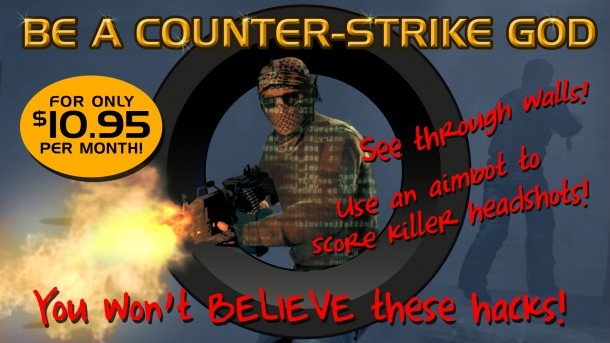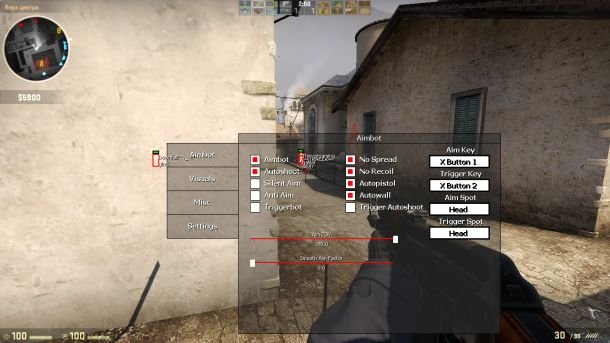Hacks! An investigation into the million-dollar business of video game cheating

Zero is a customer service representative for one of the biggest video game cheat providers in the world. To him, at first, I was just another customer. He told me that the site earns approximately $1.25 million a year, which is how it can afford customer service representatives like him to answer questions over TeamSpeak. His estimate is based on the number of paying users online at any given time, the majority of whom, like me, paid for cheats for one game at $10.95 a month. Some pay more for a premium package with cheats for multiple games.
As long as there have been video games, there have been cheaters. For competitive games like Counter-Strike, battling cheaters is an eternal, Sisyphean task. In February, Reddit raised concerns about lines of code in Valve-Anti Cheat (VAC), used for Counter-Strike and dozens of other games on Steam, that looked into users' DNS cache. In a statement , Gabe Newell admitted that Valve doesn't like talking about VAC because “it creates more opportunities for cheaters to attack the system." But since online surveillance has been a damning issue lately, he made an exception.
Newell explained that there are paid cheat providers that confirm players paid for their product by requiring them to check in with a digital rights management (DRM) server, similar to the way Steam itself has to check in with a server at least once every two weeks. For a limited time, VAC was looking for a partial match to those (non-web) cheat DRM servers in users' DNS cache.
I knew that cheats existed, but I was shocked that enough people paid for them to warrant DRM. I wanted to find out how the cheating business worked, so I became a cheater myself.
That's how I found Zero. After we finished talking, he reminded me to send him the $25 I promised him. I did not at any point say anything that could possibly even suggest that I would pay him for any reason. I asked him if he meant that was something I promised him or something that I should just do. “Both,” he said. “I also advise you not to use this information against me. That wouldn't be wise.”
How I became a cheating scumbag
Bohemia Interactive ( Arma , DayZ ) believes that only 1 percent of online players are willing to spend money to cheat on top of an already expensive hobby. Even by that estimate, Counter-Strike: Global Offensive alone had a potential 25,000 cheaters out of a total of 2.5 million unique players last month. Put on your green accountant visor, add up the player-bases of all the other popular multiplayer games cheat providers are servicing ( Call of Duty , Battlefield , Rising Storm ), and you'll see a massively profitable market.
I wanted to cheat in CS:GO. I was good, once, when I had a high school student's endless free time to pour into Counter-Strike 1.3. These days, if I can play with friends, it's fun. If I jump onto a random server I'm cannon fodder.
The biggest gaming news, reviews and hardware deals
Keep up to date with the most important stories and the best deals, as picked by the PC Gamer team.
I Googled “Counter-Strike: Global Offensive cheats,” and quickly ended up at a user-friendly cheat provider. Based on the size of its community and traffic, it's one of the biggest. I'm going to call it Ultra Cheats, a fake name, to protect the anonymity of the sources I talked to. Those sources, like Zero, have also had their online handles altered.

Ultra Cheats didn't accept credit (other sites did), so I used PayPal to buy a one-month subscription for CS:GO cheats for $10.95. This gave me access to the site's VIP forums where I could talk to other members, administrators, cheat coders, and download Ultra Cheats' cheat loader, which checks in with its DRM server. It also gave me access to around-the-clock technical and customer support via TeamSpeak.
I followed a simple list of steps, including disabling Windows' default anti-virus protection. I launched a new copy of CS:GO on a fresh Steam account belonging to “Perry C. Gamble,” “loaded” the cheat using the cheat loader, and entered a match. For the first time, I wasn't just another player, but a kind of god.
The most obvious of my new superhuman abilities was spying on other players through walls. In CS:GO, wallhacking is incredibly useful. Faceoffs around corners come down to millisecond reactions. My ability to see exactly when the enemy was coming, or to know exactly where he was hiding when I was coming, was unfair to say the least.
It was also super fun. Maybe the most fun I've had with Counter-Strike in years. I was finally getting kills, more than one in a round, but I wasn't crushing everyone else. It was like a little boost that got me back into my high school fighting shape.
I wanted to see how far I could push it. I was paying for this. I wanted to feel powerful and get my money's worth. I turned on auto-aim, and auto-trigger, which fires your weapon automatically when you point your cursor at an enemy.
I played with these options and others for a handful of matches. They didn't seem as useful as wallhacking, or they simply didn't work as well, but I was vote-kicked out of a match before I could make an educated decision. Halfway into my next match, two hours total since I started cheating, I was VAC-banned from CS:GO.

